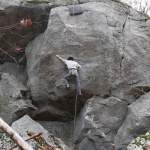
Early on Monday morning, an interfaith coalition of activists stood in front of the White House to announce a five-day hunger strike for a cease-fire in Gaza. Speakers included a handful of progressive state legislators and, conspicuously, Cynthia Nixon, an active Democratic Socialists of America member, a former New York gubernatorial candidate, and a Sex and the City star.
Addressing the crowd, Nixon declared, “Israel has killed more civilians on a tiny strip of land than were killed in 20 years of war in the entire country of Afghanistan.” She also specified that 1,200 Israelis were killed in the Hamas attacks and insisted that “none of this is normal.” Later that evening, she led other DSA members and interfaith activists in reading a list of names and ages of Palestinians killed by Israeli forces. Reading the list was an effort to show that “these aren’t just numbers, each person is a person,” Nixon later told the Cut.
More than a dozen strikers, including five state lawmakers, will gather outside the White House between 9 a.m. and 7 p.m. each day until Friday. Nixon said she would strike for two days, though a spokesperson later said she would also be striking on Wednesday. The action comes as at least 14,800 Palestinians, including 6,150 children, have been killed in the Israeli offensive in Gaza as of this week. A temporary cease-fire that began on November 24 was organized to facilitate the exchange of Israeli hostages and Palestinian detainees and allow aid into Gaza. Hamas is expected to release at least 50 hostages in exchange for 150 Palestinians by the end of the original four-day cease-fire agreement, which received a two-day extension on November 27. Israeli officials have suggested that bombing will resume in Gaza with greater intensity when the temporary truce expires, prompting activists’ demand for a permanent cease-fire.
Nixon spoke to the Cut about how her Jewish son’s activism has inspired her, navigating an industry that is punishing people for “saying the mass slaughter of civilians is wrong,” and what is giving her hope at this moment.
So many people are coming to the movement for Palestinian human rights and justice in Gaza from different backgrounds. What was your entry point into this struggle?
One is that I supported Tahanie Aboushi for Manhattan district attorney a few years ago — she’s a Palestinian New Yorker and happened to arrive in Israel the night before the attack on October 7. [Ed. note: A spokesperson clarified that Aboushi was visiting the West Bank.] We were very concerned about her and her family over there. And then there’s my oldest son. Two of my three children are Jewish. My oldest son in particular is extremely involved in the movement for justice for Palestinians and has been very active in Chicago, where he lives and was arrested for his protest about a week and a half ago.
What have your conversations with your son been like?
When this was starting, we spent a lot of time on the phone with him. He was doing everything he could in terms of protests, speeches, speaking in articles. He said to my wife and me point-blank, “You have a much bigger megaphone than I do. And I just implore you at this moment to do everything you can to bring attention to this.” His Jewish identity is very central to him. He’s the grandson of two Holocaust survivors. He said, for him, “never again” means never again for everyone. As a Jew, he feels he has a particular obligation to make sure this doesn’t happen again to another group of people. For everyone in our family, antisemitism is not a joke. It’s a serious and terrifying thing. In a recent article, my son said, for him, having antisemitism thrown about like a political football for warmongers is particularly upsetting. I couldn’t agree more.
What inspired you to join the hunger strike to demand a cease-fire, and what do you hope your actions will bring attention to?
Representative Zohran Mamdani is really the orchestrator of this event. He’s a New York assemblyman I’ve put an enormous amount of faith in. When Zohran explained to me that this was happening, I wanted to be part of it. It’s happening the week after Thanksgiving, a time when people get very distracted and caught up in the holidays. The progress made so far has been largely due to protests in this country and around the world, and it’s why we’re looking at a temporary cease-fire at this moment, why we saw the return of so many of the hostages and Palestinian political prisoners. We’ve seen all the good that can come from a cease-fire; it’s a moment we have to grab and make permanent. We need this to allow the beginnings of repair and figure out where we go from here. I think about General Petraeus during the Iraq War saying, “Tell me how this ends? How do we get out of this?” We need to stop the killings, 70 percent of whom are children and women. This mass killing of civilians, children, journalists, doctors is not making anyone safer.
We’ve been seeing a lot of consequences for people — certainly in your industry — who have spoken up in support of Palestinians or to criticize Israel’s military response. Were you nervous to raise your voice or get involved?
I try to be very careful. I try to be very respectful. This is a terrible time for Palestinians and Israelis. It’s a particularly terrifying moment for Muslims and Jews in America and across the world, where we’re seeing so much Islamophobia and antisemitism and attacks. That said, I feel we can’t be living in a world where saying the mass slaughter of civilians is wrong. That can’t be a thing we’re not allowed to say. The number of Palestinians killed in the past seven weeks is more than the number of civilians who were killed by the U.S. and its allies in almost 20 years of the war in Afghanistan. These are not normal civilian casualties. There is nothing normal about this.
Many of the mass actions in support of Palestinians that we’ve seen have been organized by Jewish activists but have still been called antisemitic. What are your thoughts in light of what you’ve shared about your family?
The Jewish people have thousands of years of trauma around being targeted, killed, put down in every way. When people say things like, “This is the largest number of Jews killed since the Holocaust,” everybody is of course triggered. “We must not allow this to happen” — yes, obviously. But that shouldn’t go against my right to criticize my U.S. government or all of our rights to criticize this far-right Netanyahu government, which many people have called fascist and is largely reviled within Israel itself. I should be careful what I say, but we should be able to call out the mass murder of civilians and children and babies as unacceptable.
You’ve signed a letter along with hundreds of other artists demanding a cease-fire. What do you see as artists’ and entertainers’ responsibility to advocate for justice?
We’re a group of people who have a megaphone, a large platform. There are a lot of actors who signed that letter, and our profession is all about empathy and putting yourself in the shoes of someone else. One of the things we’re doing with our hunger strike is calling out to President Biden, who has experienced such devastating personal loss in his own life — though he has been strangely and disturbingly insensitive through the tremendous suffering and killing in Gaza right now. He is known for his empathy. It’s one of his strengths as a leader, so we’re imploring that he listen to the will of the American people, 70 percent of whom want there to be a cease-fire. We ask him to imagine if these were his children or imagine that these were American children.
You ran for governor within the Democratic Party, and we’re seeing today that most Democratic elected officials in Congress and the White House aren’t backing a cease-fire even as the majority of Democratic voters demand this. What do you make of this disconnect?
For a very long time, supporting Palestinian rights and criticizing Israel have been a kind of third rail for people in politics. But we’re at a watershed moment where politicians have not caught up yet. I’m very encouraged by the number of Congress members who have now signed on for a cease-fire, but the number is certainly not yet reflective of what the American people want.
Are there particular voices, activists, or leaders you have been following on this issue?
I’ve been looking at a lot of footage coming out of Gaza itself. Here in the U.S., Zohran Mamdani, who organized our hunger strike, has been an important voice for me; Representative Cori Bush, who brought legislation for a cease-fire forward; and Representatives Rashida Tlaib and Alexandria Ocasio-Cortez, who I feel has been incredibly eloquent on this issue. But I have to say, of all these people I listen to, find inspiring, and follow, no one has been more important to me than my son and his commitment to doing everything within his power to make there be a cease-fire.
Hope is an important part of doing this work. Where do you find it for yourself?
I’m finding hope in that people around the world are now demanding a cease-fire and demanding that Palestinians be treated like human beings and freed. The horror we’ve seen in the past seven weeks, it’s going to be incredibly hard to recover from. But it also seems we’re at a moment where people have become aware of injustice. We’re able to see it in ways we haven’t before, and as a result, people are now unable to look away. What we’re seeing in Gaza is something we will never be able to unsee. The demand for change and that clarity are a tremendous positive.
This post has been updated.




